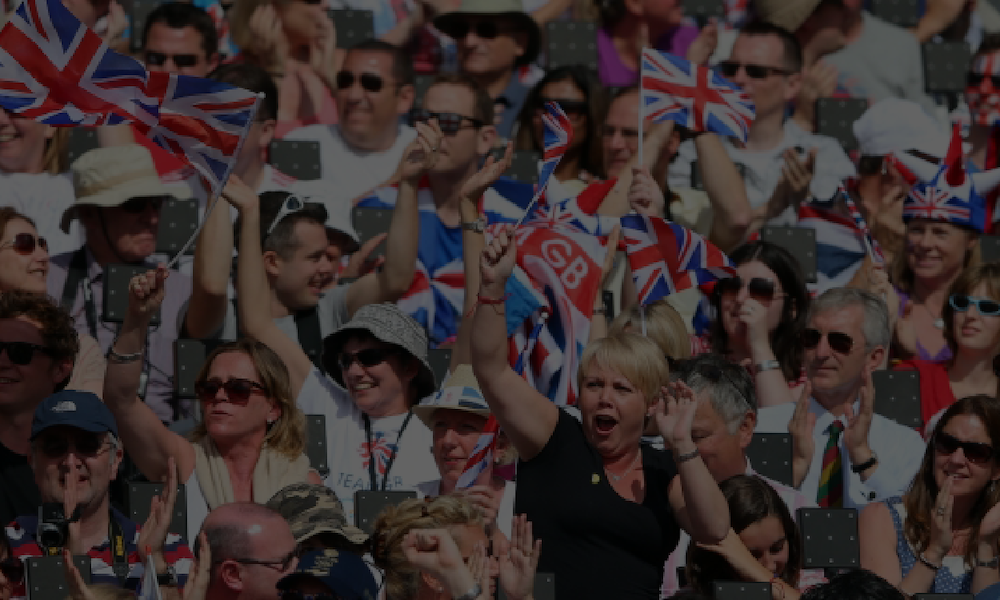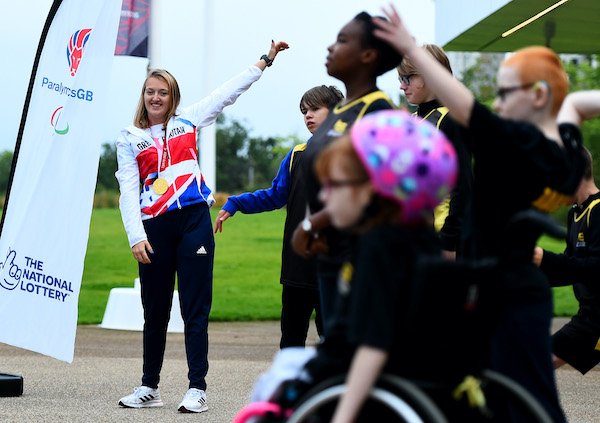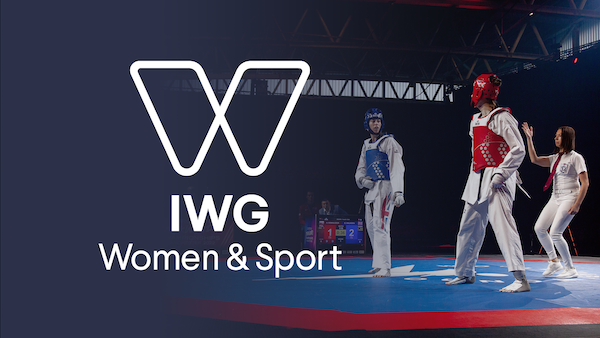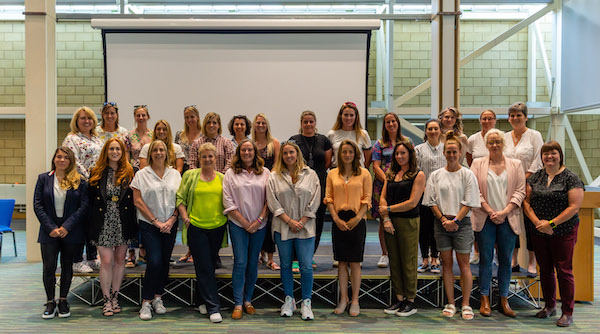
Beyond the Games 22 Partner Spotlight:
UK Sport’s Mission to Inspire Positive Change
July 15, 2022
In advance of our 26th July Beyond the Games 2022 forum in partnership with Sport England and UK Sport, we are sharing insights from a few of our event partners on transforming communities through sport across a broad range of social issues. This week, UK Sport offers a rounded view of three key areas of primary importance to realising its mission.
Funded by the UK Government and The National Lottery, UK Sport is the nation’s high-performance sports agency which has been working in partnership to lead Olympic and Paralympic sport in the UK to world class success since 1997. In May 2021, it released its 10-year strategy which outlined a mission to create “the greatest decade of extraordinary sporting moments; reaching, inspiring and uniting the nation.” However, whilst being competitive at the highest level remains the priority, UK Sport recognises that sporting success creates a powerful platform to inspire and effect lasting positive change for individuals and society.

Recent data from YouGov Sport showed that 7 in 10 global sports fans feel that more should be done with diversity, equity and inclusion in sport. 68% agree that ‘sports need to be more inclusive.’
Head of Social Impact, Tom Baker spoke on UK Sport’s approach to embedding wellbeing, equality, diversity and inclusion, and sustainability across all of its work:
“Last year, UK Sport launched our new strategic plan with a mission to create the greatest decade of extraordinary sporting moments; reaching, inspiring, and uniting the nation. One of our three ambitions is to inspire positive change. But why is this a priority for UK Sport and what does this mean in practice?
From the growing mental health crisis to the climate emergency, decreasing social mobility, to increasing inequality, the world is changing. The world of sport is just as affected by these shifts. To stay relevant and thrive long-term, we must keep pace with the changing lives of athletes, the changing nature of sports, and the changing shape of the communities that we wish to reach, inspire, and unite.
Our overall approach to inspiring positive change is first to build credibility. UK Sport is therefore embedding wellbeing, equality, diversity & inclusion, and environmental sustainability into our working practices as an organisation, and will be expecting the same of those that we invest in. Doing so will enable us to prioritise the wellbeing of every member of our high-performance sport community; ensure that diversity of talent belongs and flourishes as part of our community; and significantly reduce the environmental impact of high-performance sport.
In addition to this, we will be supporting and empowering the athletes, sports, and major events in which we invest to harness their respective power and platform. We will look to measure our progress and refine the approach we take as we learn on this journey; and together, grow the confidence and capability of the high-performance sport community to deliver ever greater impact and long-lasting change – contributing to our greatest, most impactful decade yet.”

As highlighted in YouGov’s Global Sports 2022 report, there is a healthy appetite for women's sport with over a third global sports fans agreeing that they prefer to watch women’s events.
Head of External Affairs and International Relations, Clare Barrell spoke to us about a project that helped bring the International Working Group (IWG) on Women and Sport – the world’s largest network dedicated to advancing gender equity and equality in sport – back to the UK:
“IWG was established in Brighton in 1994 and has been travelling around the globe, changing hosts every four years, building its global network and using insight and research to advance gender equality in sport around the world. Along with the Sport and Recreation Alliance and Sport England, we supported the bid that led to the IWG coming back to the UK for its next tenure (2022-2026), thirty years after it was first formed.
Hosting the IWG will enable the UK and the rest of the world to connect, learn and share the change in creating a truly sustainable sporting system that has gender equality, diversity and inclusivity at its heart, and which recognises the fundamental role that women and girls – and sport as a whole – play in building a just and prosperous post-pandemic world.
COVID exacerbated many inequalities around the world with a disproportionate and damaging impact on women and girls in several areas of our social and economic life – including in sport. Now is the perfect time to get on board with the IWG and, as leaders in sport, it is our responsibility to build a better future for women and girls.
The IWG will be in a period of co-governance with its current host New Zealand. On 4th August, the two secretariats will meet with international leaders at the Commonwealth Games for an event celebrating women in sport and a discussion on the challenges to come. The final handover to the UK will take place in November at the 8th IWG World Conference on Women and Sport in Auckland, New Zealand. But before then, you can learn more about IWG and how to get involved by attending the Beyond the Games Forum on 26th July in Birmingham, where Secretary General, IWG Women and Sport Secretariat & Conference 2018-2022, Rachel Froggatt and European Rowing Chair and British Olympic Association Deputy Chair, Annamarie Phelps will expand on IWG’s mission to achieve gender equality in sport and physical activity worldwide.
COVID exacerbated many inequalities around the world with a disproportionate and damaging impact on women and girls in several areas of our social and economic life – including in sport. Now is the perfect time to get on board with the IWG and, as leaders in sport, it is our responsibility to build a better future for women and girls.”

UK Sport recognises the importance of developing the next generation of female leaders in sport. After seeing the lack of female coaches at the Rio 2016 Olympic and Paralympic Games - only 11% of coaches were female - the organisation knew it had to do something about it.
Head of Culture, Talent and Development, Alex Stacey shared UK Sport’s approach to this issue:
“We really wanted to understand, how can we shift the dial on the lack of female coaches at major sporting events and increase numbers within this area. We know the importance of diversity in our coaching workforce and so, we launched the Women in Leadership: Female Coaching Programme in 2020. We have been fortunate that Professor Sophia Jowett at Loughborough University has led the programme brilliantly, supported by Diccon Edwards, Coaching Lead at UK Sport in how they do that.
We set ourselves a target of reaching a coaching population in which 25% were female by the 2024 Paris Olympic and Paralympic Games. We did think that was quite a lot to expect of ourselves, but we wanted to set something that was ambitious and aspirational. It was really encouraging to see that we went to Tokyo 2020 with a coaching workforce that was 17% female, and we’re proud of the changes we have made to date.
The programme has now seen two separate cohorts of over 40 coaches come through the programme. I have seen and heard first hand from individuals that the programme has really made a difference to their coaching, their practice with their athletes, and their own experiences of where they are on their career journey and their coaching development journey.
At our recent final celebration event, all the coaches reflected on the benefits of the programme and the connectivity and power of their new network. They said it was vital and an unbelievable opportunity to connect with the coaching mentors who've delivered several experiences and led teams and Olympic and Paralympic Games, including Paula Dunn (Team Leader for the Olympic Programme at British Athletics) and Jayne Ellis (Performance Advisor at UK Sport and former Performance Director at British Wheelchair Basketball).”
Register for Beyond the Games 2022 today! Join representatives from Brands, Teams & Leagues, NGOs, Rights Holders, Local Authorities, International Federations, National Governing Bodies and Academia at Birmingham's Villa Park as we focus on sport's role in Tackling Inequalities, Health & Well-Being and Environmental Sustainability.